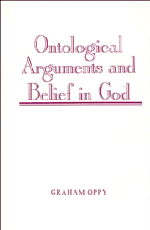Book contents
- Frontmatter
- Contents
- Preface
- Acknowledgments
- Ontological arguments and belief in God
- Introduction
- 1 Some historical considerations
- 2 Definitional arguments
- 3 Conceptual arguments
- 4 Modal arguments
- 5 Meinongian arguments
- 6 Experiential arguments
- 7 “Hegelian” arguments
- 8 Application to historical arguments
- 9 Are there (other) global objections to ontological arguments?
- 10 Is existence a predicate?
- 11 The uses of parody
- 12 Are ontological arguments of any use to theists and/or atheists?
- Conclusion
- Literature notes
- Bibliography
- Index
5 - Meinongian arguments
Published online by Cambridge University Press: 05 May 2010
- Frontmatter
- Contents
- Preface
- Acknowledgments
- Ontological arguments and belief in God
- Introduction
- 1 Some historical considerations
- 2 Definitional arguments
- 3 Conceptual arguments
- 4 Modal arguments
- 5 Meinongian arguments
- 6 Experiential arguments
- 7 “Hegelian” arguments
- 8 Application to historical arguments
- 9 Are there (other) global objections to ontological arguments?
- 10 Is existence a predicate?
- 11 The uses of parody
- 12 Are ontological arguments of any use to theists and/or atheists?
- Conclusion
- Literature notes
- Bibliography
- Index
Summary
There is no easily stated version of the type of ontological argument that I call ‘Meinongian’. What these arguments have in common is that they rely upon, or assume, a theory of objects that, in relevant respects, is similar to the theory of objects defended by Meinong. Hence, these arguments cannot be understood in isolation from the theory of objects - and so I begin with a sketch of the relevant features of that kind of theory.
The theory begins with the assumption that there are properties. This assumption is intended to be understood in a way that does not exclude the possibility of nominalism - that is, it leaves open the possibility that talk of properties ought to be reconstrued as talk of predicates. The theory also assumes that predicate expressions in natural language uniquely express properties - so that, for example, each of the following expresses a different property: ‘is round’, ‘is round and square’, ‘is square and round’, ‘is taller than Dudley Moore’, ‘prefers the squalid life of a stockbroker to the noble life of a politician’.
Against this background, objects are specified by, or perhaps identified with, unordered collections of properties. Any distinct collection of properties specifies a distinct object. Thus, for example, the property ‘is round and square’ specifies a distinct object from the property ‘is square and round’.
Information
- Type
- Chapter
- Information
- Ontological Arguments and Belief in God , pp. 85 - 91Publisher: Cambridge University PressPrint publication year: 1996
